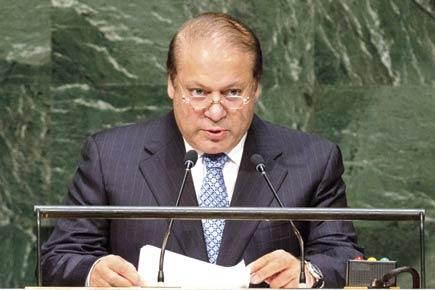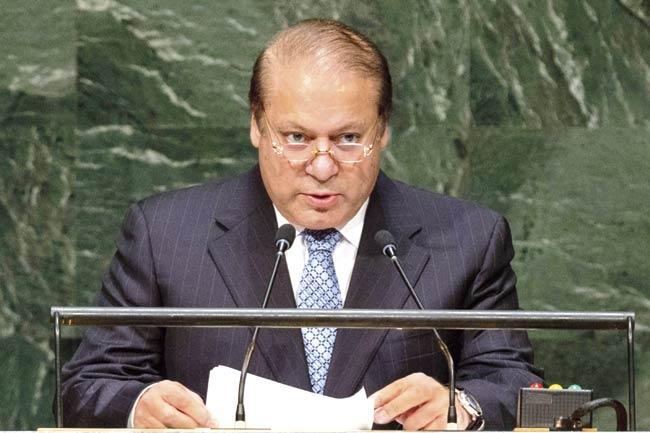Since 1991, India has pursued a policy of engaging Pakistan, regardless of what the latter has thrown at us — bombs, terror assaults, fedayeen

 Since 1991, India has pursued a policy of engaging Pakistan, regardless of what the latter has thrown at us - bombs, terror assaults, fedayeen. This has meant an effort to promote dialogue to resolve outstanding issues, and develop ties with the civilian governments, as against the military. However, two decades later, it seems that this is not working.
Since 1991, India has pursued a policy of engaging Pakistan, regardless of what the latter has thrown at us - bombs, terror assaults, fedayeen. This has meant an effort to promote dialogue to resolve outstanding issues, and develop ties with the civilian governments, as against the military. However, two decades later, it seems that this is not working.
If anything, the deep state dominated by the military retains its iron grip on the system and the civilian system remains unable to get its act together. The ‘Lion of Punjab’ Nawaz Sharif is looking like a lamb, while his rival Bilawal Bhutto has become the butt of jokes, and as for Imran Khan, the less said the better.
ADVERTISEMENT

There were expectations that Nawaz Sharif could keep the army in check and initiate an opening up to India. But a year later, he is a spent force and has been successfully boxed in by the army. Pic/Getty Images
Maybe the time has come to change course — not by reaching out to the military or taking recourse to tit-for-tat covert war. But by encouraging the peaceful breakup of Pakistan. Across the Islamic world, boundaries and states created by colonial powers are breaking down, and there is no reason to assume that Pakistan ought to be an exception. Using military means or a covert war would be counterproductive, but there could be a way out by persuading the international community that this is the best course, and by providing moral and political support to those who advocate separatism in Pakistan.
No doubt there will be Pakistanis who will claim that this is exactly what they always feared and that India has never reconciled to the creation of Pakistan. But we most certainly do not advocate the annexation of Pakistani territory, not even of Pakistan Occupied Kashmir.
The Bangladesh war is another issue. But by now, there is enough evidence to show that the responsibility for the loss of East Pakistan rests firmly with Islamabad. All that India did was play the role of a
midwife who actually prevented greater bloodshed and horrors. Had India been the factor, Pakistan could have reunited in the 1977-1984 period when anti-Indian governments held sway.
Actually from the outset, it is Pakistan which has promoted violence to obtain the breakup of India. In the 1950s and 1960s, the ISI used its location in East Pakistan to aid the Naga and Mizo insurgencies. In the 1980s, after re-establishing themselves in Bangladesh, they became the principal backers of ULFA and continued giving support to whichever dissident group they could find in the North-east.
Then, when opportunity arose in the west, the ISI jumped into the fray in Punjab in the early 1980s and, few years later, into Jammu & Kashmir. Simultaneously, they also began promoting terrorist attacks across the country. There were two aims in mind. First, the breaking away of two important states of the Indian union. Second, encouraging communal violence with the view of developing an unbridgeable communal divide in the country.
Most Indians, even now, believe that it is in their interest to have a stable and united Pakistan on their western borders, notwithstanding the hostility they have faced in recent decades. This is not because of any altruism, but a perceived national interest in not having a failed nuclear state on our borders. However, without any particular Indian encouragement or assistance, Pakistan is trending towards collapse and chaos.
There is no dearth of fault lines in Pakistan. The primary ones are ethnic, pitting the dominant Punjabis against the Baloch and the Sindhis, with the Mohajirs as a category of their own. The newer one shaping up is one which pits the Pakhtun-dominated Taliban against Pakistan. Then there are sectarian lines, primarily dividing the Sunni and the Shia. But the really complex one divides its dominant military from its civilian establishment.
The idea of Pakistan breaking up has been around for a while. There are two impulses for this. First is from within, where ethnic groups such as the Pakhtuns, Baloch and Sindhis want out of the Punjab-dominated system. The second is from the point of view of the global community, for whom Pakistan has proved to be a menace as an exporter of terrorism and a proliferator of nuclear weapons. But so far the idea has been confined to think tanks and some individuals. Smaller units will certainly reduce the megalomania of the generals who have exaggerated notions of Pakistan’s standing in the comity of nations by virtue of its nuclear weapons and ability to give pain to its neighbours, namely India and Afghanistan.
The one thing that can save Pakistan is the normalisation of ties with India and opening up to the larger economy to its east. But there are equally powerful forces that have prevented this from happening and they show no signs of weakening.
There were expectations that Nawaz Sharif was the leader who could keep the army in check and initiate an opening up to India. However, a year later we find that Nawaz is a spent force and has been successfully boxed in by the army. No one is clear as to where things go from here.
So far, India has displayed little or no inclination from getting involved in Pakistan’s internal issues, Islamabad’s claims to the contrary notwithstanding . But now our own security demands that we begin thinking about the unthinkable, and consulting with like-minded countries on the issue.
A nuclear-armed Pakistan needs to be handled carefully and there is little scope for adventurism here.
As noted, we are not advocating a violent breakup, but a velvet event of the kind that led to the emergence of the Czech and Slovak Republics.
The writer is a Distinguished Fellow, Observer Research Foundation, New Delhi
 Subscribe today by clicking the link and stay updated with the latest news!" Click here!
Subscribe today by clicking the link and stay updated with the latest news!" Click here!







